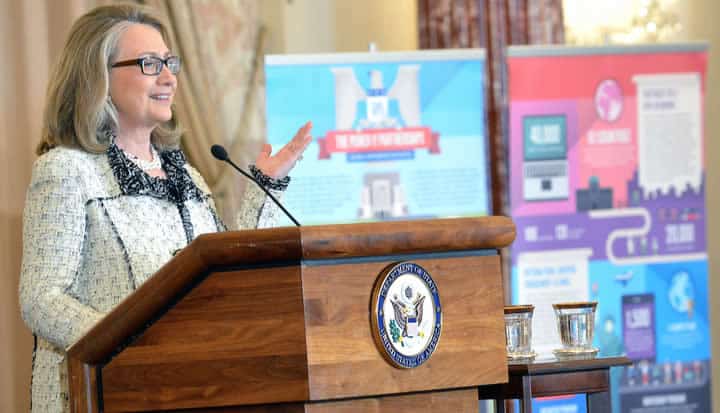Yesterday, Secretary of State Hillary Rodham Clinton hosted over 200 representatives from business, non-governmental organizations, and civil society groups to celebrate the power of collaboration. As one of the last events the Secretary hosted, the meeting was momentous. Not only for the more than $80 million in public-private partnerships announced but also because it showcased how much has been achieved over the last four years.
When the Secretary joined the Department in 2009, she prioritized partnerships as a critical tool of foreign policy. For the Secretary, “Smart Power” is about advancing our mutual interests around the globe by leveraging the best of what America and our partners have to offer to reduce global threats and seize global opportunities. As the Secretary has often said, a healthy society is akin to a three-legged stool. One leg must be open, accountable government that delivers results for its people. One must be a dynamic, competitive private sector that creates jobs and economic opportunity for people. And the third leg of the stool is civil society — just regular people like you and I — who are working to improve the lives of your fellow citizens. We are on solid ground when we are balanced, when all three are working together to solve problems and create opportunities.
Public-private partnerships embody this concept. Through public-private partnerships, the State Department works with the private sector, civil society, faith-based organizations, and non-governmental organizations to create jointly defined solutions to shared challenges. As a result, the Department has realized significant gains and is creating enduring solutions that strengthen diplomacy, deepen development impact, and achieve targeted goals around key priority issues including climate change, women’s empowerment, human rights, diaspora engagement, innovation and entrepreneurship, and economic statecraft.
The Secretary launched the Global Partnership Initiative (S/GPI) four years ago to serve as the entry point for collaboration with the private sector and non-governmental organizations. To date, the office has mobilized more than $650 million in external resources and engaged with over 1,100 partners in support of our U.S. foreign policy agenda. And throughout the Department, we’ve seen that partnerships are becoming increasingly integrated into our work. Within the Office of Global Women’s Issues, for example, we have focused on designing and supporting innovative partnerships and programs to improve the lives of women and girls around the world through theSecretary’s International Fund for Women and Girls.
The partnerships have a very real impact on people’s lives. Take cookstoves, for example. Last month, The Lancet released a study which estimates that household air pollution causes the deaths of four million people annually — this is double what we thought. Many of those most affected are women and young children.
Through partnerships such as the Global Alliance for Clean Cookstoves, we have launched a market-based approach to address this critical issue and get cleaner cookstoves into the hands of millions around the globe. The U.S. role has truly been whole-of-government, with over 10 federal agencies committing up to $114 million, as well as valuable technical expertise.
And we are already seeing successes. We have helped create preliminary international standards for clean cookstoves, launched critical research, promoted critical investment tools to support innovative cookstove businesses, and helped millions of families in Bangladesh, China, Ghana, Kenya, Nigeria, Uganda and around the world access these stoves so they can live healthier, more productive lives.
Other partnerships, such as WEAmericas and the African Women’s Entrepreneurship Program, have been created with Wal-Mart, the ExxonMobil Foundation, and others, to support the growth and expansion of women’s entrepreneurship, which we know plays a significant role in driving economic growth.
Or look at our efforts to promote women’s entrepreneurship with a range of partners from Wal-Mart, Tupperware, Exxon Mobil, Coca Cola, Goldman Sachs, and Pepsico to Cherie Blair Foundation, the Aspen Institute and Vital Voices; to promote innovation with the Rockefeller Foundation or the efforts to combat violence against women with Avon, or attack maternal and child mortality with the support of the Gates Foundation and the What to Expect Foundation.
So many partners have worked to advance progress for women and girls.
And today, we celebrate our progress, while looking ahead to the myriad challenges we still face. Moving forward, we hope to continue growing existing partnerships, while exploring new opportunities for further engagement. We are particularly excited about several new partnerships that Secretary Clinton announced today, including wPower, a multi-million dollar initiative designed to empower women clean energy entrepreneurs; the Alliance for Affordable Internet, which will provide a unified voice and focus in addressing the shared goal of open, affordable access to the Internet; the Arcus Foundation has made a $1 million commitment to match corporate contributions to the Department’s Global Equality Fund, which seeks to protect the human rights of lesbian, gay, bisexual and transgender persons worldwide; and a number of significant new commitments that support and advance access to clean cookstoves in low-income communities around the world.
Partnerships are the way of the future. The S/GPI office has streamlined and institutionalized partnership building across the Department, significantly enhanced training and technical assistance for Department staff, and is leading inter-governmental efforts to create a community of practice around partnerships. Just yesterday, a section on partnerships was added to the Foreign Affairs Manual in order to encourage and authorize Department staff around the world to be collaborative and creative in solving major challenges.
When you look at the enormity of the challenges that lie ahead, it is clear. We need to continue to think differently about how we conduct diplomacy and development. We must create new opportunities for government, civil society and business partners to collaborate on shared challenges to solve real problems.
This blog was first published on DipNote, the U.S. State Department’s Blog, and is reproduced with permission.










